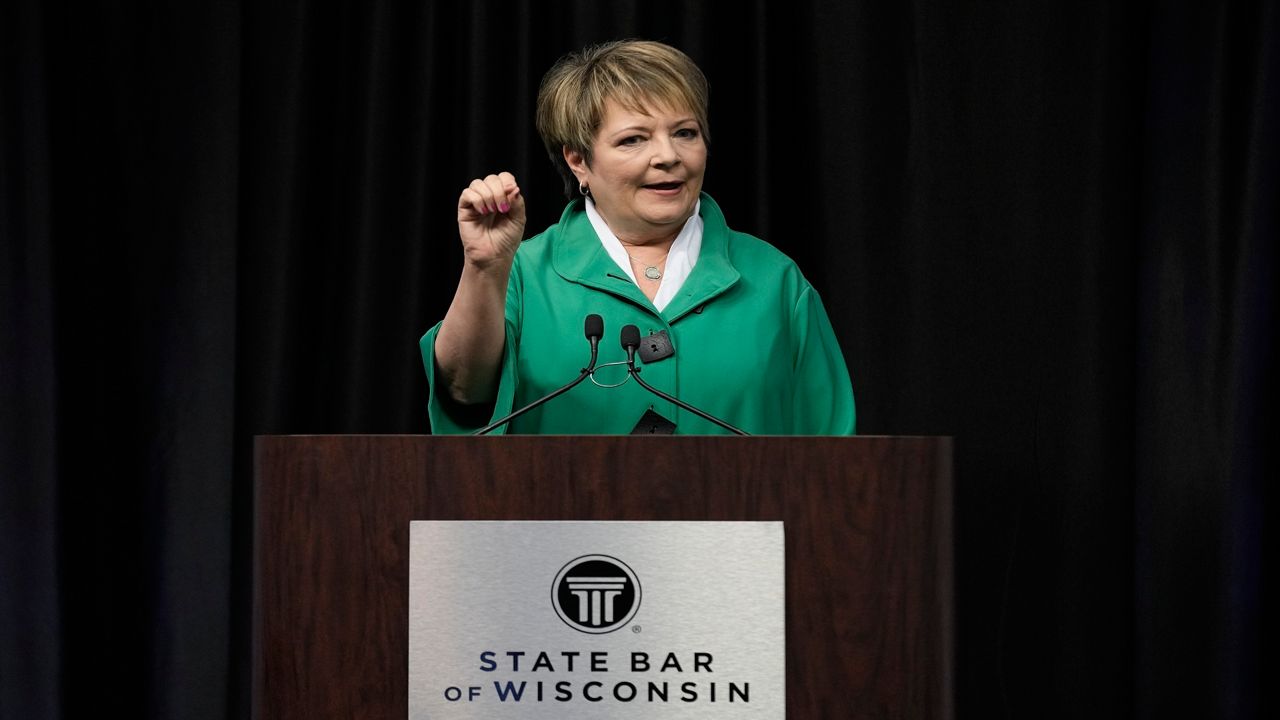MADISON, Wis. (AP) — Wisconsin's Republican-controlled Legislature is talking about impeaching a newly elected liberal state Supreme Court justice even before she has heard a case.
The unprecedented attempt to impeach and remove Justice Janet Protasiewicz from office comes as the court is being asked to throw out legislative electoral maps drawn by the Republican-controlled Legislature in 2011 that cemented the party's majorities, which now stand at 65-34 in the Assembly and a 22-11 supermajority in the Senate.
Here is a closer look at where things stand:
How did the state get here?
Protasiewicz won election in April to a 10-year term on the Wisconsin Supreme Court beginning Aug. 1. Her 11-point victory gave liberals a 4-3 majority, ending a 15-year run with conservatives in control.
During her first week in office, two lawsuits were filed by Democratic-friendly groups and law firms seeking to overturn Republican-drawn legislative maps.
Why is there talk of impeachment?
Republican lawmakers who have talked about the possibility, most notably Assembly Speaker Robin Vos, allege Protasiewicz has prejudged redistricting cases pending before the Supreme Court because of comments she made during her campaign. They also argue her acceptance of nearly $10 million from the Wisconsin Democratic Party disqualifies her.
The state Democratic Party is not part of either redistricting lawsuit, but supports the efforts.
The court has yet to say whether it will hear the redistricting challenges. Protasiewicz also has yet to say whether she will step aside in the cases, including the decision on whether to hear them.
If she does step aside, the court would be divided 3-3 between liberal and conservative justices. However, conservative Justice Brian Hagedorn has sided with liberals on major cases in the past, angering Republicans.
What exactly did Protasiewicz say?
Protasiewicz frequently spoke about redistricting during the campaign, calling the current Republican-friendly maps “unfair” and "rigged."
“Let’s be clear here,” she said at a January forum. “The maps are rigged here, bottom line.”
“They do not reflect people in this state," Protasiewicz said at the same forum. "I don’t think you could sell any reasonable person that the maps are fair. I can’t tell you what I would do on a particular case, but I can tell you my values, and the maps are wrong.”
She never promised to rule one way or another.
What does the law say about recusal and impeachment?
On recusal, the U.S. Constitution’s due process clause says a judge must recuse if they have a financial interest in the case, or if there is a strong possibility of bias.
There are also state rules laying out when a judge must step aside from a case. Those generally include any time their impartiality on a case can be called into question, such as having a personal bias toward one of those suing, having a financial interest or making statements as a candidate that “commits, or appears to commit” the judge to ruling one way or another.
On impeachment, the Wisconsin Constitution limits the reasons to impeach a sitting officeholder to corrupt conduct in office or the commission or a crime or misdemeanor.
Has a Wisconsin Supreme Court justice ever been impeached?
The Wisconsin Legislature has voted only once to impeach a state judge who was alleged to have accepted bribes and heard cases in which he had financial interests. It happened in 1853, just five years after statehood, and the state Senate did not convict.
How would she be impeached?
It takes a majority vote in the Assembly to impeach and a two-thirds majority, or 22 votes, in the Senate to convict. Republicans have enough votes in both chambers to impeach and convict Protasiewicz.
If the Assembly impeached her, Protasiewicz would be barred from any duties as a justice until the Senate acted. That could effectively stop her from voting on redistricting without removing her from office and creating a vacancy that Democratic Gov. Tony Evers would fill.
Vos, the Assembly speaker, has said he is still researching impeachment and has not committed to moving ahead.
The day after Protasiewicz was elected, Wisconsin Senate Majority Leader Devin LeMahieu seemed to cast doubt on the Senate proceeding with impeachment.
“To impeach someone, they would need to do something very serious,” LeMahieu told WISN-TV. “We are not looking to start the impeachment process as a regular occurring event in Wisconsin.”
When could this get cleared up?
The court is under no deadline to decide whether it will hear the redistricting challenges. Likewise, Protasiewicz doesn't have a deadline for deciding whether she will recuse herself. Both decisions could come at any point.
If the court decides to hear the challenges, it would then set a timeline for arguments. It is unclear when, if Protasiewicz remains on the case, the Legislature might proceed with impeachment proceedings.



